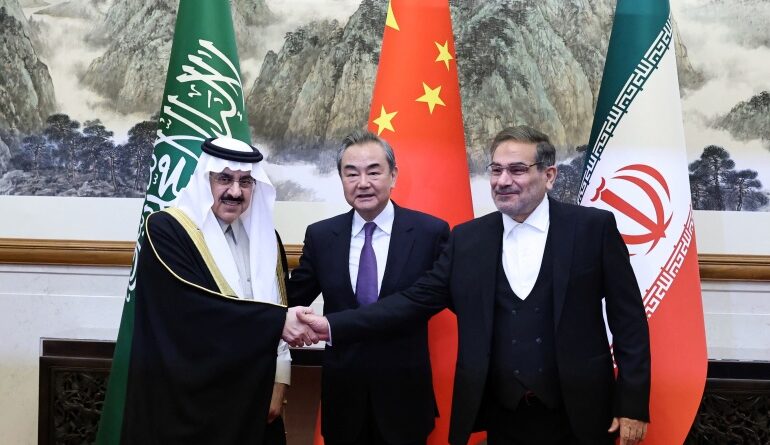
Ali Shamkhani, one of the top figures in the Iranian establishment, has stepped down as the country’s security chief after nearly a decade.
State media confirmed on Monday that President Ebrahim Raisi, as head of the Supreme National Security Council (SNSC), has appointed Ali Akbar Ahmadian, a senior commander in the Islamic Revolutionary Guard Corps (IRGC), as Shamkhani’s replacement. .
Shamkhani had been appointed SNSC secretary in September 2013 and has been instrumental in shaping Iran’s security policies over the past decade.
He appeared to announce his departure on Sunday afternoon by posting an excerpt of a cryptic poem on Twitter by the 16th-century Iranian poet Muhtasham Kashani.
Shamkhani leaves his post after successfully completing a détente with Saudi Arabia, which saw the two countries agree to restore diplomatic relations after a seven-year rift in a deal brokered by China in March .
Tehran is also on track to improve its diplomatic relations with other neighbors in the region while drawing ever closer to Russia and China, as its ally Syria has also been welcomed back into the Arab League.
Relations with the West, however, remain highly contentious, amid stalled efforts to restore Iran’s 2015 nuclear deal with world powers and after protests rocked Iran last September. The SNSC had been in charge of the nuclear file, as well as being one of the main bodies handling the local unrest, but Shamkhani was just one of the council’s voices.
China’s Wang Yi, center, Iran’s Ali Shamkhani, right, and Saudi Arabia’s Musaad bin Mohammed al-Aiban during a meeting in Beijing, China, March 10, 2023. [File: China Daily via Reuters]
In a speech on national security that turned out to be his farewell speech, Shamkhani said the world order is changing and Iran must adapt its macro policies to it.
“A new world order would at first mean a disruption of the current order and disorder due to the evolution of the current order, but this is not inherently positive, and our disposition and role in the new world order is the that can make positive changes for us,” he said.
He also spoke of the so-called “axis of resistance” of Iranian-backed forces across the region, saying: “Current circumstances may be favorable to the axis of resistance, but we must not reverse the doctrine of resistance in a doctrine of domination”.
In a meeting last week with Foreign Minister Hossein Amirabdollahian and Iranian ambassadors to other countries, Supreme Leader Ayatollah Ali Khamenei also alluded to a changing world order, saying that it will be a “hard process full of unexpected events” for which Iran must prepare. .
Why did he leave?
No detailed official reason has been given for Shamkhani’s departure, but it may indicate that the country is moving in an increasingly conservative direction, as Shamkhani was considered relatively pragmatic.
Shamkhani’s departure had been rumored – and vehemently denied by state media – several times before, most recently earlier this year.
Speculation about his immediate departure had grown in January, after one of his closest former allies, former dual-national officer Alireza Akbari, was executed for spying for Britain.
British-Iranian Akbari, who was one of Shamkhani’s deputies at the defense ministry 20 years ago, was hanged amid UK convictions for allegedly acting as a “key spy” for Britain’s intelligence service.
Shamkhani was also the second longest-serving security chief since the country’s 1979 revolution, which gave birth to the current theocratic establishment, behind only former president Hassan Rouhani, who served as SNSC secretary for nearly 16 years in from 1989.
It remains unclear how long he will remain in Iran’s power centers moving forward, but he has proven adept at navigating the country’s military and political landscape over the past few decades.
A man of versatility
Arguably the highest-ranking ethnic Arab figure within the establishment since the revolution, Shamkhani is the only top-level figure to have served at the highest levels of the country’s military and the IRGC, and has also held important positions in reforms, centrists and conservatives. presidential administrations.
A career military man, he was one of the most influential figures in the IRGC in its nascent years after the revolution, and was among its top commanders during the eight-year war between Iran and Iraq in eighty
He led the elite force division in the western province of Khuzestan, which bore the brunt of the war, and was later promoted to deputy commander-in-chief, then head of the IRGC’s ground forces .
Shortly after the war ended, Khamenei, who had just become the country’s supreme leader, appointed Shamkhani as commander of the Iranian army’s navy, and later installed him as head of the IRGC navy. He currently holds the rank of rear admiral, the highest naval rank that can be awarded by the commander-in-chief of the armed forces, the supreme leader.
When reformist politician Mohammad Khatami became president in 1997, Shamkhani was selected as Minister of Defense and held that position until 2001. Shamkhani challenged Khatami in the next election cycle, but failed to upset his re-election. However, he returned as Minister of Defense and served until 2005.
During the eight-year term of ultraconservative President Mahmoud Ahmadinejad, Shamkhani was largely out of the spotlight, but returned when the moderate Rouhani won the presidency in 2013.
Rouhani, who as president led the SNSC, appointed Shamkhani as secretary, replacing ultraconservative Saeed Jalili, who still plays a key role in the council as the supreme leader’s representative and continues to influence domestic and foreign policy from Iran
Shamkhani was Iran’s fourth security chief since the revolution after Rouhani, Ali Larijani, who was secretary for only about two years, and Jalili, who held the post for roughly six years.
[ad_2]
Source link





